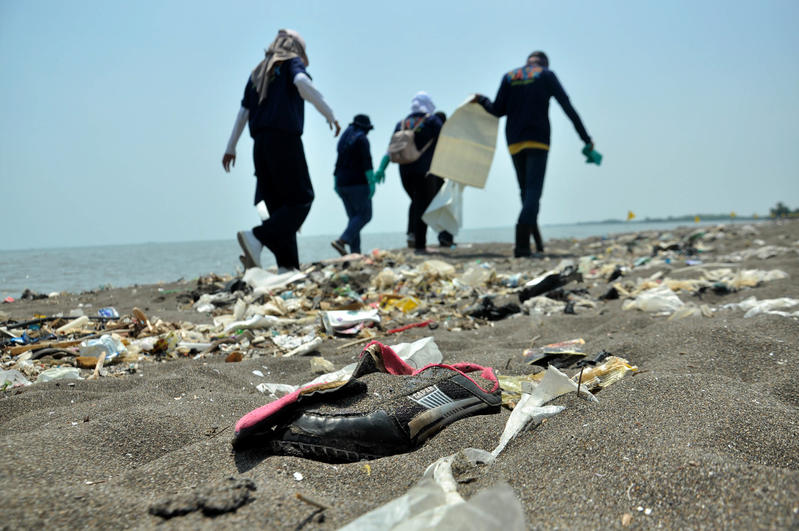
Greenpeace volunteers collect and brand audit plastic garbage during the Beach Clean Up activity at Kuk Cituis beach, Tangerang Banten. Greenpeace Indonesia is holding the same activity in other 2 cities in Indonesia, Yogyakarta and Bali, as a part of the #BreakFreeFromPlastic global movement to reduce single use plastic products usage and also identify the brands that are most responsible.
Jakarta, Indonesia – Fast moving consumer goods (FMCG) corporations are a predominant force behind the throwaway economic model driving the plastic pollution crisis, according to a comprehensive sector survey Greenpeace International released today. None of the companies surveyed have plans to put the brakes on the growing production and marketing of single-use plastics, while the solutions they are exploring will only perpetuate the problem.
“We hoped to identify industry leaders through this process, but instead found that the whole sector has failed to take responsibility for the plastic pollution crisis and is instead trying to maintain the status quo,” said Ahmad Ashov, Global Plastics Project Leader, Greenpeace Indonesia. “There is a lack of transparency and all current public commitments by these companies allow for an increased use of single-use plastic in the future. That needs to change.”
“Their current business model is based on the assumption that ultimately all plastic packaging can, and will, be collected and recycled into new packaging or products.”
The four companies that reported the highest sales of single-use plastic products (Coca-Cola, PepsiCo, Nestlé and Danone) were also the top four brands identified in a recent global Break Free From Plastic brand audit report following 239 plastic pollution cleanups in 42 countries.
Greenpeace’s report, “A Crisis of Convenience: The corporations behind the plastics pollution pandemic”, focuses on 11 of the biggest FMCG companies: Coca-Cola Company, Colgate-Palmolive, Danone, Johnson and Johnson, Kraft Heinz, Mars, Nestlé, Mondelez, PepsiCo, Procter & Gamble and Unilever.
Key findings:
- Single-use packaging is the main delivery system used by all of the FMCG companies, with no signs of changing.
- None of the surveyed FMCG companies have comprehensive strategies that include commitments to move away from single-use plastic.
- Most FMCG companies are actually increasing the amount of single-use plastic packaging and waste they produce.
- Most FMCG companies know or disclose little about the amount of their packaging that is recycled and even less about the destination of their plastic waste after consumption.
- Despite their significant plastic footprint, solutions being explored by businesses are primarily related to addressing recyclability or recycling, not reducing or creating new delivery systems.
- There is a lack of transparency in the sector and few FMCG companies are willing to disclose important data about their plastic use.
The survey looked to determine the degree to which FMCG commitments, actions and performance are addressing the environmental and social impacts of their plastic packaging and waste.
“The sector urgently needs to change its business model and prepare for a world where disposable products and packaging are no longer acceptable,” said Ashov.
Notes:
See the executive summary of the report “A Crisis of Convenience: The corporations behind the plastics pollution pandemic” can be accessed here.



